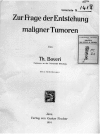Cancer: we should not forget the past
- PMID: 25553086
- PMCID: PMC4278912
- DOI: 10.7150/jca.10336
Cancer: we should not forget the past
Abstract
Cancer has been in existence longer than human beings, and man has been facing the illness ever since he made his appearance on Earth. Amazingly, the first human cancer gene was cloned only thirty years ago. This, and other extraordinary scientific goals achieved by molecular cancer research in the last 30 years, seems to suggest that definitive answers and solutions to this severe disease have been finally found. This was not the case, as cancer still remains to be defeated. To do so, cancer must be first understood. This review highlights how cancer onset and progression has been tackled from ancient times to present day. Old theories and achievements have provided the pillars of cancer understanding, in laying the basis of 'modern era' cancer research, are discussed. The review highlights the discovery of oncogenes and suppressor tumor genes, underlining the crucial role of these achievements in cancer diagnosis and therapies. Finally, an overview of how the modern technologies have given impetuous to expedite these goals is also considered.
Keywords: Cancer theories; genomics.; oncogenes.
Conflict of interest statement
Competing Interests: The authors have declared that no competing interest exists.
Figures
Similar articles
-
Enhancement of Plant Productivity in the Post-Genomics Era.Curr Genomics. 2016 Aug;17(4):295-6. doi: 10.2174/138920291704160607182507. Curr Genomics. 2016. PMID: 27499678 Free PMC article.
-
Abass Alavi: A giant in Nuclear Medicine turns 80 and is still going strong!Hell J Nucl Med. 2018 Jan-Apr;21(1):85-87. doi: 10.1967/s002449910713. Epub 2018 Mar 20. Hell J Nucl Med. 2018. PMID: 29550853
-
Cancer Drug Development: New Targets for Cancer Treatment.Oncologist. 1996;1(3):II-III. Oncologist. 1996. PMID: 10387987
-
Oncogenes and tumor suppressor genes in breast cancer: potential diagnostic and therapeutic applications.Oncologist. 2004;9(4):361-77. doi: 10.1634/theoncologist.9-4-361. Oncologist. 2004. PMID: 15266090 Review.
-
Achievements in Cancer Research and its Therapeutics in Hundred Years.Curr Top Med Chem. 2019;19(17):1545-1562. doi: 10.2174/1568026619666190730093034. Curr Top Med Chem. 2019. PMID: 31362690 Review.
Cited by
-
A historical and palaeopathological perspective on cancer.J Prev Med Hyg. 2024 Mar 31;65(1):E93-E97. doi: 10.15167/2421-4248/jpmh2024.65.1.3221. eCollection 2024 Mar. J Prev Med Hyg. 2024. PMID: 38706766 Free PMC article.
-
Cancer chemotherapy and beyond: Current status, drug candidates, associated risks and progress in targeted therapeutics.Genes Dis. 2022 Mar 18;10(4):1367-1401. doi: 10.1016/j.gendis.2022.02.007. eCollection 2023 Jul. Genes Dis. 2022. PMID: 37397557 Free PMC article. Review.
-
Cancer Stem Cells: Formidable Allies of Cancer.Indian J Surg Oncol. 2015 Dec;6(4):400-14. doi: 10.1007/s13193-015-0451-7. Epub 2015 Aug 19. Indian J Surg Oncol. 2015. PMID: 27081258 Free PMC article.
-
Regeneration linked miRNA modify tumor phenotype and can enforce multi-lineage growth arrest in vivo.Sci Rep. 2021 May 18;11(1):10538. doi: 10.1038/s41598-021-90009-9. Sci Rep. 2021. PMID: 34006907 Free PMC article.
-
Contribution of Angiogenesis to Inflammation and Cancer.Front Oncol. 2019 Dec 12;9:1399. doi: 10.3389/fonc.2019.01399. eCollection 2019. Front Oncol. 2019. PMID: 31921656 Free PMC article. Review.
References
-
- Hajdu SI. A note from history: landmarks in history of cancer, Part 1. Cancer. 2011;117:1097–102. doi: 10.1002/cncr.25553. - PubMed
-
- Henschen F. Yamagiwa's tar cancer and its historical significance. From Percival Pott to Katsusaburo Yamagiwa. Gann. 1968;59:447–51. - PubMed
-
- Boveri T. Zur frage der entstehung maligner tumoren. Jena, Germany: Gustav Fisher; 1914.
-
- Boveri T. Concerning the origin of malignant tumours by Theodor Boveri. Translated and annotated by Henry Harris. J Cell Sci. 2008;121(Suppl 1):1–84. doi: 10.1242/jcs.025742. - PubMed
Publication types
LinkOut - more resources
Full Text Sources
Other Literature Sources
Miscellaneous



